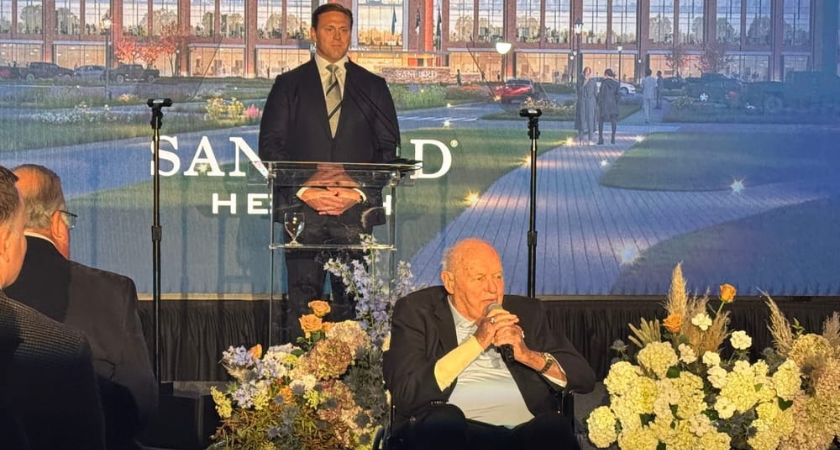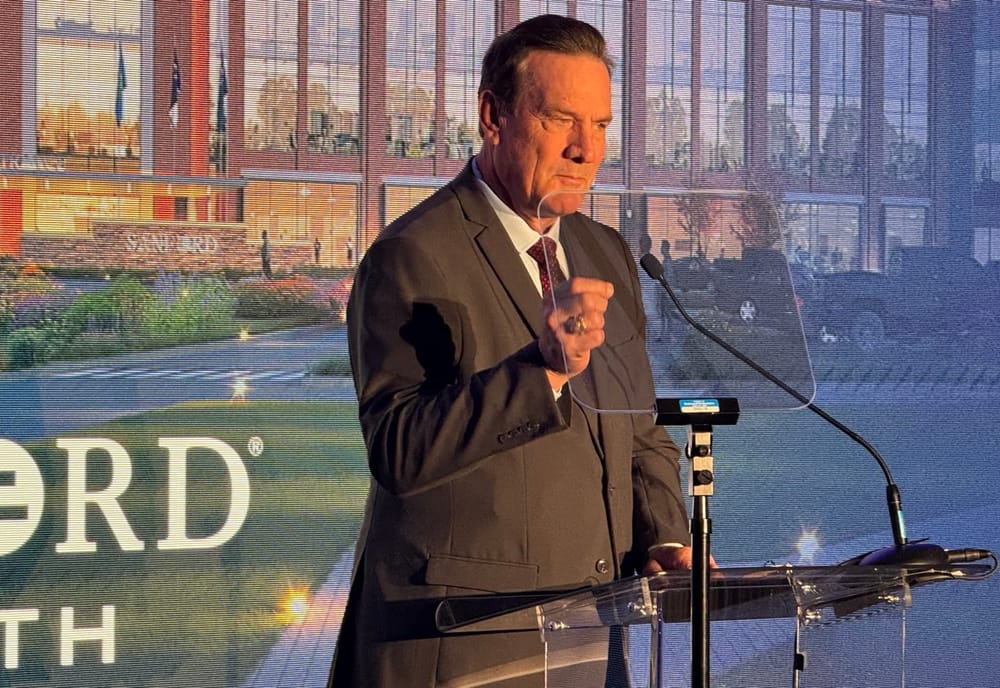
RAPID CITY, S.D. — Sanford Health has announced one of the largest health care investments in western South Dakota’s history: a $500 million hospital and medical campus to be built on the southwest side of Rapid City, supported by a transformative $300 million donation from philanthropist Denny Sanford.
Speaking to a packed room at the Hyatt Place on Monday, Sanford, 89, addressed the crowd from his wheelchair. Despite the magnitude of his lifetime giving — nearly $2 billion in total — the philanthropist humbly reflected on his connection to South Dakota.

"I am the lucky one," Sanford said. "It's been a marvel to me how much I love this state."
The new medical campus marks the next phase of Sanford Health’s westward growth, reflecting both the Black Hills’ accelerating population and the company’s broader strategy to expand advanced clinical services across the Great Plains.
Sanford Health CEO Bill Gassen emphasized the far-reaching impact of the project, describing the donation as a catalyst for health care transformation not just locally, but across the entire region.
"Denny Sanford's generous philanthropic investments have enabled Sanford Health to transform care for millions of people across the Midwest," said Gassen. "With his support and partnership, we are proud to [bring] that same transformative impact to western South Dakota, building a healthier future for generations to come."
The new campus is planned for a 103-acre site east of U.S. 16, roughly five miles from downtown Rapid City. Construction will begin in 2027, with completion targeted for 2030.
The 480,000-square-foot medical center will deliver a comprehensive suite of services designed to meet the needs of a fast-growing region:
The design anticipates future population growth, medical workforce expansion, and the increasing demand for specialty care in western South Dakota.
The new hospital will join an expanding set of Sanford Health facilities acquired or launched in the past few years, including:
These acquisitions have created a broad clinical hub that Sanford aims to integrate with the new hospital for improved continuity of care.
Although Sanford Health has not finalized staffing numbers for the new campus, the organization is already investing in the region’s future healthcare workforce. The $300 million donation includes:
These investments aim to address workforce shortages, especially as western South Dakota prepares for rapid growth spurred by military expansion at Ellsworth Air Force Base.
CEO Bill Gassen highlighted western South Dakota’s accelerating growth as a key driver, noting that Ellsworth Air Force Base’s upcoming B-21 bomber mission has further increased demand for advanced medical services in the region.
Sanford’s expansion positions Rapid City as a regional medical hub capable of serving communities across South Dakota, eastern Wyoming, Nebraska, and Montana.
South Dakota Lt. Gov. Larry Rhoden welcomed the investment, saying it will bring world-class care closer to home for thousands of residents.
Rhoden said the hospital "will expand access to world-class health care right here in Rapid City. More health care providers will mean more choices for South Dakotans and more choices will mean increased access and quality of care."
Rapid City Mayor Jason Salamun echoed that sentiment, calling the project a cornerstone in the city’s evolution into a regional medical center.
.jpg)
"One of the things I'd really love to see in Rapid City is that we become a health care hub for the region," Salamun said. "We are so blessed to have exceptional health care here and it will continue to get better as we have yet another amazing health care system in our community."
Monument Health, which operates hospitals in Rapid City, Sturgis, Spearfish, and surrounding areas, will become a direct competitor to the new Sanford facility. But Sanford Health hopes the two systems can complement each other rather than clash.
Gassen noted that Sanford collaborates closely with Avera Health in Sioux Falls and hopes similar partnerships may emerge in the Black Hills.
Monument Health President and CEO Paulette Davidson acknowledged that the new hospital raises questions about future competition, but expressed openness to collaboration.
She said she has “both questions and concerns” about how Sanford’s arrival will impact operations but hopes the two organizations can work together to serve western South Dakota residents more effectively.
With construction set to begin in 2027, the new Sanford Health campus represents one of the most significant health care investments in state history. Leaders say it will fundamentally reshape the health care landscape of western South Dakota for decades.
Denny Sanford’s humility at the announcement underscored the personal connection behind the gift — a donation that will leave a lasting legacy across the Black Hills.
Originally reported by Bart Pfankuch in SD News watch.